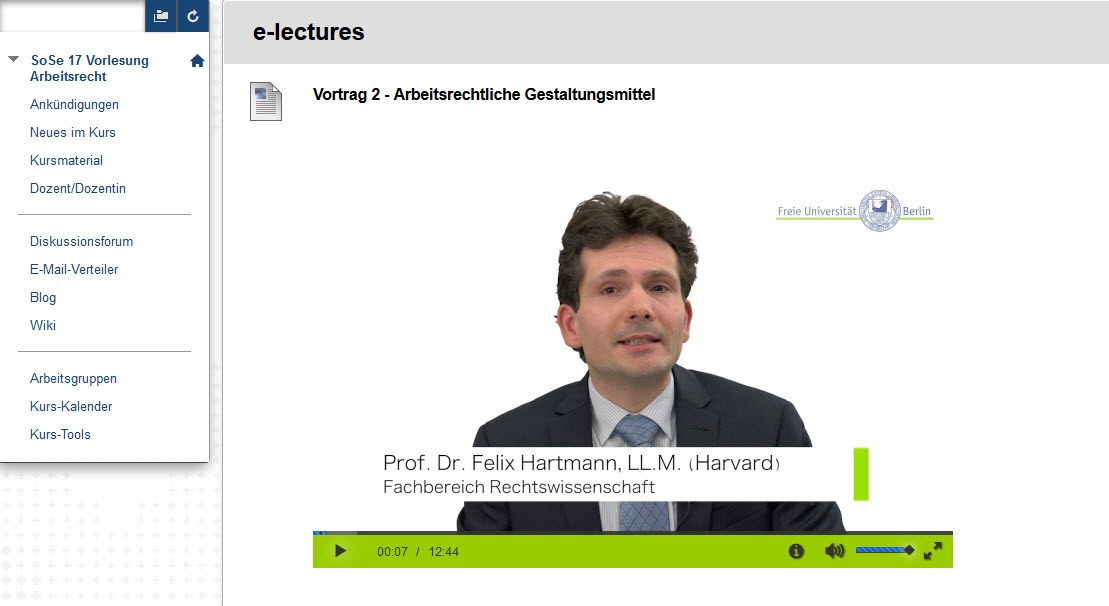Course
| Course title | Lecture "Labor law" |
| Department / Institute | Law |
| Degree course | Mandatory law course |
| No. of participants | Several hundred |
| Phase | 4th semester |
| Duration | The course is offered on an annual basis |
Tools
The video sequences were provided via Blackboard. A supplement using tests and surveys is planned.
Realization
The realization of the project (usage of video recordings) was closely coordinated with Stefan Cordes and Wolfram Lippert of CeDiS. Valuable input was also given by participating in the CeDis course e-teaching for e-learning.
The videos were recorded using the so-called green screen technology. With this, the background and foreground can be easily edited or supplemented after the actual studio recording has taken place. Further information on the green screen studio at the Center for Digital Systems can be found here.
Ill. 1: e-lecture labour law design tools (Blackboard inclusion)
For the recordings two different cameras were used: In the sequences with the wide camera setting the green screen was replaced by slides with bullet points and graphics. In the closeup settings of the lecturer these slides are out of focus in the background.
Ill. 2: e-lecture green screen (inclusion of slides and graphics)
The change between the distance and the close-up camera was successful on two levels: On the one hand, this makes it more lively and, on the other hand, a sensible use of the two perspectives can be lead to a clear division of different sections of the lecture. Altogether 23 e-lectures were recorded.
Further development of the e-lectures
The course is provided on an annual basis. The basic concept of the lecture will be kept to in the coming years and extended as well. As labor law is quickly ever-changing, it may become a requirement to change or edit the lecture videos, maybe even having to re-produce some. The focus of the work in the future, however, should be on Die Veranstaltung wird jährlich angeboten. Das Grundkonzept der Vorlesung soll auch in den kommenden Jahren beibehalten und weiter ausgebaut werden. Weil das Arbeitsrecht erfahrungsgemäß einem raschen Wandel unterliegt, mag es erforderlich sein, einige der Lehrvideos zu verändern oder sogar neu zu produzieren. Der Schwerpunkt der künftigen Anstrengungen soll allerdings darauf liegen, die Verzahnung zwischen Lehrvideos und Präsenzlehre zu verbessern. So sollen insbesondere Tools zur Selbstevaluation des Lernerfolgs angeboten werden. Ein einfacheres Szenario hierfür können Multiple-Choice-Fragen oder Lückentexte sein. Anspruchsvollere Modelle könnten kollaborative Lehrformen wie etwa die wikigestützte Fallbearbeitung in Gruppen einschließen.
Evaluation und Erfahrungen
Am Ende des Semesters fand eine Evaluation der Lehrveranstaltung statt. Zum Einsatz kamen dabei Fragebögen, die in Zusammenarbeit mit dem Studienbüro des FB Rechtswissenschaft spezifisch an das E-Learning-Szenario angepasst wurden. Die studentischen Reaktionen auf das Konzept der Lehrveranstaltungen waren nahezu ausnahmslos positiv. Als Hauptvorteil der Lehrvideos wurde häufig genannt, dass die Filme auch wiederholt angesehen werden können und Unterbrechungen z.B. für Notizen möglich sind. Ebenfalls positiv bewertet wurde der Umstand, dass die Lehrvideos für mehr zeitliche und örtliche Flexibilität im Studienalltag sorgen. Die besondere Lehrform hat für ungewöhnlich starkes Interesse an der Vorlesung gesorgt und die Motivation der Studierenden spürbar erhöht.
Aus meiner Sicht als Lehrender hat sich das MOC-Konzept im Großen und Ganzen bewährt. Die Notwendigkeit, in kurzer Zeit eine Vielzahl von Lehrvideos zu drehen, habe ich auch für mich persönlich als bereichernde Herausforderung empfunden. Bei der Videoproduktion hatte ich mehr Gelegenheit, über meine Lehrmethoden zu reflektieren, als dies im universitären Alltag sonst möglich ist. Weil die reine Wissensvermittlung überwiegend in Form von Lehrvideos erfolgte, konnte ich die Präsenztermine noch interaktiver anlegen als bisher. Nicht völlig zufrieden bin ich rückblickend allerdings mit der für mich sehr zentralen Verzahnung von videobasierter Wissensvermittlung und Präsenzlehre. Etwa in der Mitte des Semesters hatte ich in einigen Präsenzveranstaltungen den Eindruck, dass nur ein Teil der Studierenden die vorbereitenden Lehrvideos angesehen hatte. Dies mag allerdings, wie ich einräumen muss, teilweise darauf zurückzuführen sein, dass der Video-Workload vor einzelnen Präsenzterminen etwas zu hoch angesetzt war.
Insgesamt beurteile ich die Etablierung des MOC zum Arbeitsrecht als vielversprechenden Einstieg in das E-Learning.
Support offered by CeDiS
- Consulting services for the implementation of digital solutions in teaching: The Center for Digital Systems (CeDiS) has extensive experience of many years when it comes to the implementation of digital media and systems within the fields of teaching, learning and research. We offer a wide variety of consulting services on the implementation of these tools and systems within the entire academic scope and especially at Freie Universität Berlin.
- Training courses and workshops: For lecturers at Freie Universität Berlin (professors, employees, tutors) as well as lecturers of other universities CeDiS offers training courses and workshops on the topic of teaching and learning with digital media. These course enable participants to implement online elements within their own sphere of teaching.
- The Executive Board of the Freie Universität supports e-learning initiatives: With the e-learning funding program financial resources are provided to lecturers that enrich and improve their courses quality-wise by implementing technological and media-related support. All of the academic staff teaching, the lecturers or even the institutions of the Freie Universität - without the Charité-Universitätsmedizin - can be supported within this program.

